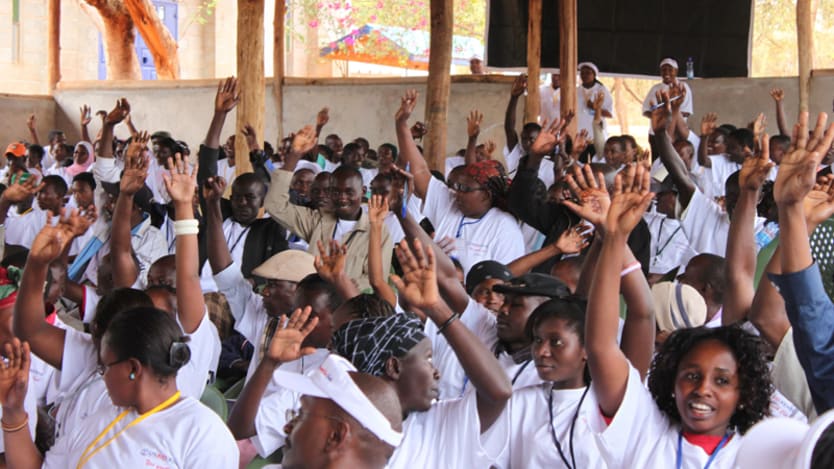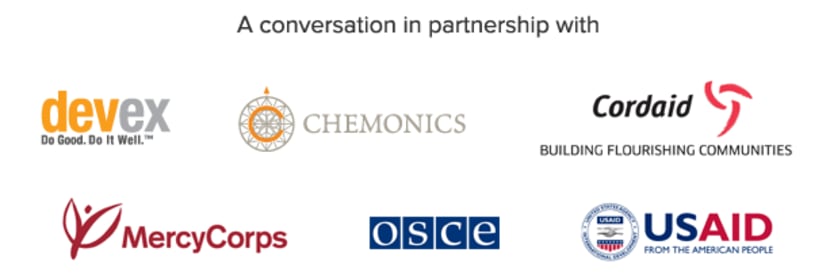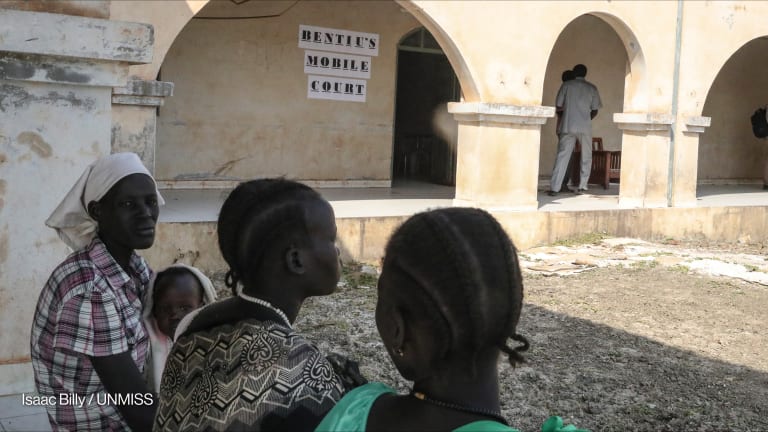
While it may seem that conflict is constantly bubbling up around the globe, there are scores of people working to keep tensions from boiling over on a daily basis. From creating paths for hostile governments to compromise over natural resources to implementing technology to gather data in conflict zones, there are real strides being made to maintain peace in conflict and “post-conflict” zones. No matter what the method or plan, however, all agree that before any method can efficiently work, good governance must be in play.
“What we see as probably the biggest instigator of conflict is feelings around injustice,” said Rebecca Wolfe, the director of conflict management at Mercy Corps. “The governance issues are critical.” An all-around conflict expert, Wolfe was referring to her work with youth engagement in Kenya, where young people, sometimes gang members, were able to engage with local governments about what was happening around them. Before that could happen, however, local leaders had to be transparent and accountable.
From the Philippines to Tunisia to Latin America, whenever Wolfe described her work and experience — whether it was about youth engagement or the role of women or education — she always came back around to the importance of good governance. Without that root, even the most structurally sound, pitch-perfect programs falter.
She is not alone in that assessment. Gidon Bromberg, the Israeli director of EcoPeace Middle East, also emphasizes the role of leaders in making progress on environmental issues. Bromberg’s organization works with Israeli, Palestinian and Jordanian mayors along the Jordan River Valley on water issues, including working together to clean up sewage overflow in the river and sharing much-needed water in a region where it is scarce.
“We’re all about trying to promote integration, good governance and transparency on a cross-border level,” said Bromberg. His team begins the process by taking groups of people on tours along the river where the borders meet to see the devastation. This pilgrimage of sorts peaks the interest and sympathy of residents, who understand that it is in their mutual interest to work together — and tell their leaders to work together — to clean up the river. It becomes not only an environmental issue, but a financial one.
“That’s the beauty of working on the water issue,” said Bromberg, “it’s tangible, you can see it, you can smell the stench.”
Bromberg and his team also use technology to persuade reluctant leaders to share water. Eighty percent of the waste water in Israel is now being treated and reused for agriculture, which has created a water abundance. Without that abundance, Israel would never have agreed to water release in the River Jordan, or to begin selling more water to Gaza, where 1.8 million people will benefit. While there is still a long way to go, the advances made in relations in a historically stubborn region provide hope that they may be able to make advances elsewhere.

“The challenge ahead is how to use the advance in technology to create the political will,” said Bromberg.
While technology is enabling organizations to make palpable progress with natural resources, it is also affecting data collection across a wide swath of peacekeeping efforts. The proliferation of cell phones, social media and access to the internet allows organizations to accurately gather information about the situation on the ground in conflict and post-conflict zones. Not only does this information help get aid to people in crisis, it works to identify and prevent conflict.
“Conflict countries were once considered data deserts and today they are data blizzards,” said Sheldon Himelfarb, president of PeaceTech Lab, an organization that uses the intersection of technology and media toward peace-building efforts. PeaceTech Lab, in addition to scores of other groups both small and large, have been harnessing the power of technology to understand more accurately what is happening on the ground. This understanding is absolutely essential to assessing local needs in any given area — and therefore helps pave the path for addressing very real problems from the bottom-up, rather than from the top-down.
“With technology, it’s not possible to say we don’t know what people think anymore,” said Helena Puig Larrauri, co-director of Build Up. “In the same way you can’t do it about health issues, you can’t do it with peace-building either.”
While all this information is more accessible, there are still hurdles to overcome when it comes to implementation. How can peacekeeping organizations use this information to affect policy? In the case of PeaceTech Lab, exchanges allow civil servants to work with the tech sector to brainstorm. In Kenya, tech companies have enabled people to report brewing conflict in real time, which allows leaders to prevent crises. In other cases, individuals can call for help. While there is still a long way to go, the field is making exponential advances, just like technology.
That said, the exciting present and future of the use of technology to further peace still hinges on good governance. No matter how advanced the efforts, if leadership is corrupt or in disarray, implementation becomes a problem.
“The power of technology is that you can listen to people in a meaningful way,” said Larrauri, “but you need to connect to the places of power.”
Most every expert emphasized the importance of good governance in order to achieve any tangible goals — to have a real impact. No matter how many creative, innovative, well-meaning programs are in place, they often fall short unless supported by a transparent government. Time and again valiant efforts fall to corrupt governments, or accurate data does not reach the halls of power where policy is made. Making sure these two factors meet will inevitably play a very important role in the future of peace building.
Conflict in Context is a monthlong global conversation on conflict, transition and recovery hosted by Devex in partnership with Chemonics, Cordaid, Mercy Corps, OSCE and USAID. We’ll decode the challenges and highlight the opportunities countries face while in crisis and what the development community is doing to respond. Visit the campaign site and join the conversation using #ConflictinContext.
Search for articles
Most Read
- 1
- 2
- 3
- 4
- 5








